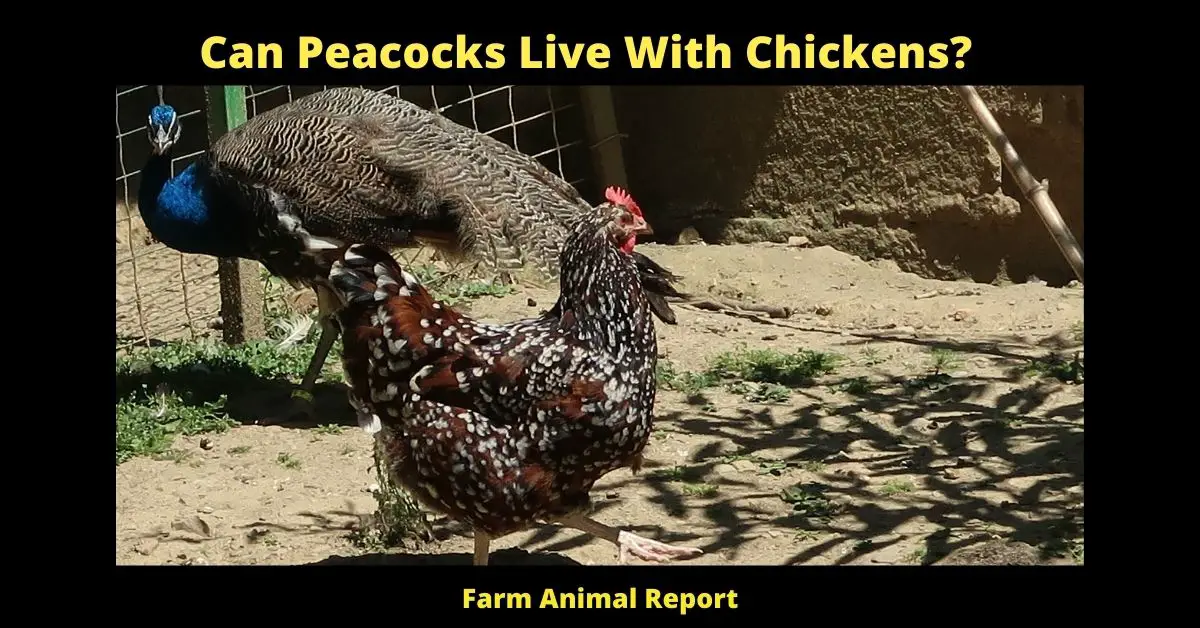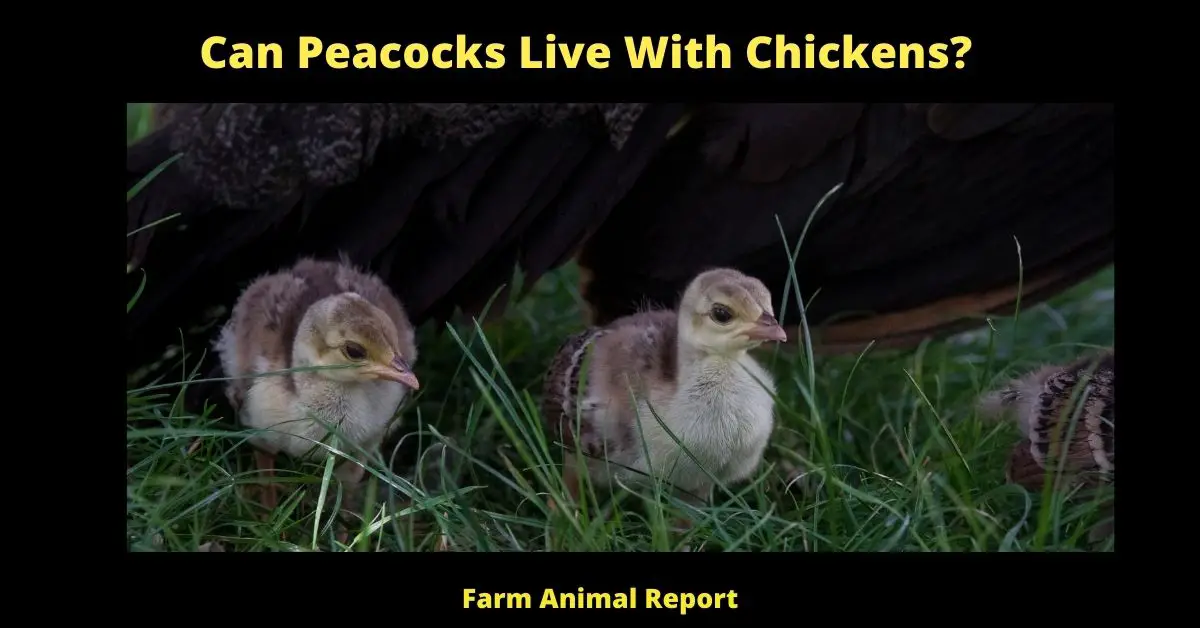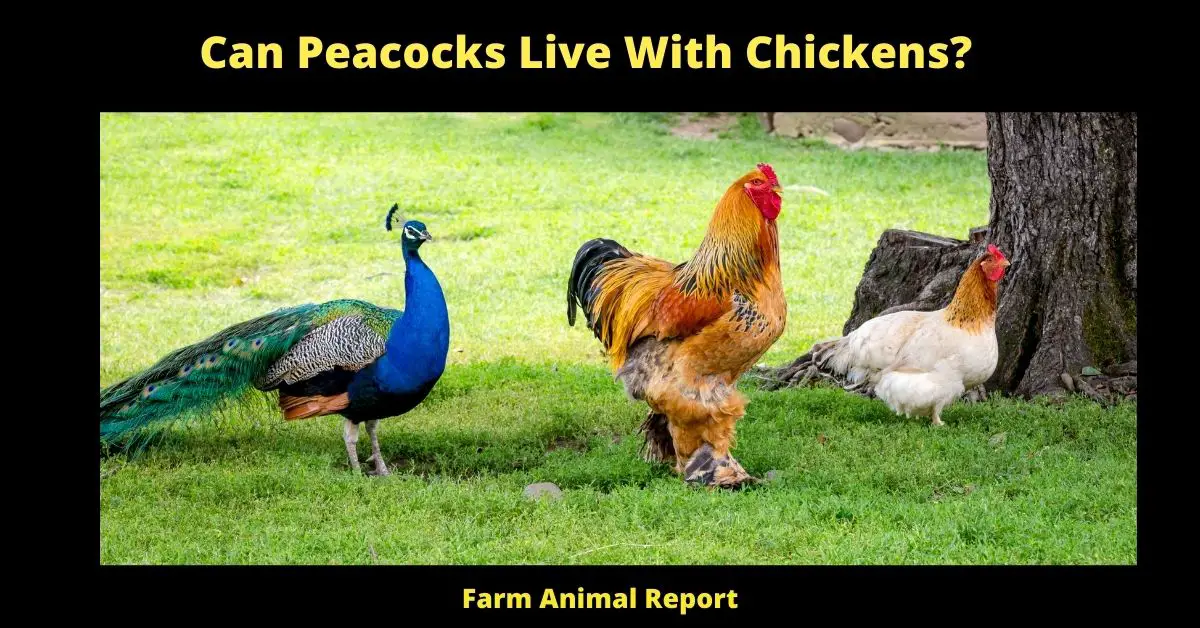As a general rule Peacocks can live with Chickens the challenge is The main issue is that chickens are renowned for transmitting infectious diseases like blackheads to other birds, including peacocks. So, it is generally suggested that they not be coupled with peacocks. Keep in mind that if you’re raising peacocks alongside chickens, they’ll need to be dewormed regularly, much like a dog or a cat. Peacocks are particularly susceptible to parasites and other illnesses transmitted by chickens.
Can Peacocks Live With Chickens?
Many chicken keepers will go on to become animal collectors. This is because chickens open the door to many other creatures to care for. If you have chickens, it’s likely that you’ve thought of obtaining a different sort of bird to assist your flock.
Peacocks are large, elegant birds that make excellent pets since they are one of a kind. If you’re thinking about obtaining peacocks, you might be wondering if they’ll be able to coexist peacefully with your hens.
Let us discuss… Can Peacocks Live With Chickens?
Yes, peacocks can live with chickens, although there are certain hazards associated with that.
The main issue is that chickens are renowned for transmitting infectious diseases like blackheads to other birds, including peacocks. So, it is generally suggested that they not be coupled with peacocks.
If You would Like to add to Your Peacock Raising Library Check Out These Great Books on Amazon
Keep in mind that if you’re raising peacocks alongside chickens, they’ll need to be dewormed regularly, much like a dog or a cat. Peacocks are particularly susceptible to parasites and other illnesses transmitted by chickens.
Maintain a secure environment for your chickens and peacocks by fencing them in or placing them in a fenced-in yard. A sufficient quantity of room should be provided for each flock or group so that they may freely move, explore and get away from one another.
Jump to 10 Ways to Make **MONEY** Peacock Farming
Peacocks make good “watchdogs,” and if they are startled, they will scream. This will occasionally be sufficient to frighten away predators or even notify you if there are any in the vicinity.
That peacock behavior can assist you in protecting your chickens from predators such as raccoons, opossums, skunks, rats, and other rodents, among other things.
Although chickens and peacocks can coexist in the same yard, they should have individual coops for sleeping and nesting since they have different housing requirements.
Fencing Suggestions
Peacocks are extremely valuable decorative birds, and the rope mesh peacock fencing can provide them with the protection they require.
Stainless steel wire rope mesh may be used to cover a variety of peacock cages to satisfy the demands of a peacock garden. Furthermore, it has greater coordination strength in a variety of situations.
Metal panels should be used at the bottom of the pens as sight barriers so that the cocks do not fight between the enclosures, as well as around the perimeter, to assist prevent climbing animals from ripping through.
Feeds Suggestions
Peacocks are opportunistic feeders that will eat everything and everything they come across. In addition, the peacock’s diet is diverse. Peacocks feed for seeds, plants, flowers, grasses, and grains in their natural environment.
Furthermore, because of their high protein nutritional requirements, they are more likely to consume insects and animals as well as vegetables. – Can Peacocks eat Chicken Feed?
Everything on their food list, especially items they discover on the ground, might be considered the favorite food of a peacock. During the day, they spend a significant amount of time on the ground.
They have excellent vision and hearing abilities. They employ their exceptional senses of sight and hearing to locate small reptiles, small mammals, small fish, and insects in the wild.
Naturally, in their local habitat, peacocks eat an omnivorous diet that includes both animals and insects, as well as plants. While being grown in captivity, the domestic peacock is often fed commercial bird and poultry feed.
Many poultry enthusiasts who maintain peafowl in their backyards give them grain, such as oats or corns, to keep them healthy and happy. Feeding natural material should also be provided while foraging and free-roaming to maintain optimal health.

Egg Suggestion
Peacocks are male peafowl, and peahens are responsible for egg production. Blue Indian Peahen eggs are significantly bigger than chicken eggs, measuring around 3 inches in length and 2 inches in width. Keep in mind that this fluctuates from bird to bird and relies on the peafowl species being considered.
Peafowl eggs are safe to consume. Unless you are talking about the size of the egg, there isn’t much difference between eating a peahen egg and eating a chicken egg.
The incubation time for peahen eggs is between 28 and 30 days, depending on the species.
When compared to eggs from geese, ducks, and chickens, peafowl eggs are often easier to distinguish. How Often do Peacocks lay eggs?
Housing Suggestions
Peacocks have a reputation for being a nuisance to their neighbors. Check your local zoning regulations to ensure that peacocks are legal in your neighborhood.
Peacocks like wandering around your neighborhood and into your neighbors’ yards. They have been observed eating flowers, gardens, and even jumping on top of automobiles.
The majority of peacock owners opt to keep their birds in a completely enclosed cage to prevent them from roaming. Their cage should be 12 feet wide by 16 feet long, with a height of around 8 feet. They should also have sleeping perches that are approximately 5 feet above the ground so that their tails do not come into contact with the ground.
Peacocks may be quite noisy, which may result in a few neighbors complaining or becoming irritated. Keeping your peacocks in a big coop might sometimes assist in confining some of the screechings, resulting in a quieter environment.
During the winter, they will require a very big coop, shed, or barn to keep them safe from the elements such as the cold and snow.
Can Peacocks Live Alone?
The Peafowl species may be found in flocks, which are groups of birds that live together. Peacocks can be observed traveling alone during the daylight, but as soon as the sun sets, they gather in large groups and take up residence on tall trees.
Peacocks may readily live in an area with lush flora and a forest-like atmosphere, which is ideal for them.
Will Peacocks Stay in Your Yard?
Staying of peacock in your yard depends upon two factors:
- The first is that it is dependent on the size of your backyard. If your backyard is very large, then yes, they remain in it.
- The second possibility is that if you let a peacock walk freely in your yard, it is quite improbable that it would always remain in your yard.
Peacocks have a strong desire to roam and explore, and it is not uncommon for them to travel long distances when they are out exploring.
This does not restrict you from allowing them to roam about freely. Many individuals do this, and they never lose sight of their birds.
When they do not return home at the end of the day, there may be issues. On the other hand, Peacocks will often return to areas where they know they will find a decent food supply, water, and shelter.
Is There a Peacock and a Chicken Hybrid?
Unfortunately, peacocks and chickens are not compatible breeding partners. They are unable to do so in the wild, and they have not been able to do so even with the assistance of artificial insemination so far.
The genetic makeup of the two bird species is simply too diverse for them to mate with one another. However, this is a prevalent mistake that may have something to do with the terminology used in relation to peacocks.
While the entire species is referred to as peafowl, the terms peafowl and chicken are used interchangeably when it comes to discussing particular.
Female peafowl is referred to as peahens, much like female chickens are referred to as hens. Peacocks are male peafowl, and cock is another term for a male rooster.
Can Peacocks Live With Ducks?
On the other hand, Peacocks are solitary birds who, for the most part, do not get along with other birds. But if you forcefully kept them with ducks. They can adjust to living beside them.
Can Peacocks and Turkeys Live Together?
Peacocks and turkeys get along well with one another and may coexist peacefully. They may eat the same feed, live in the same enclosure, and even be raised together from a young age if they are grown in the same environment. You must, however, ensure that there is enough food, drink, and room available to avoid difficulties.

Will Peacocks Kill Chickens?
It is undoubtedly feasible for peacocks to prey on chickens and kill them. Although peacocks are typically pleasant in nature, they are still game birds equipped with weaponry claws on their foot and a powerful mouth meant to eat prey.
What Do Baby Peacocks Eat?
Baby peacocks (known as peachicks) are very interested in their parents’ doing. Their parents will train them on how to hunt and scrounge for food on their own. Consequently, similar to the explanation, what they consume is determined by several aspects such as their environment, behavior, anatomy, and so on.
If you raise peafowl from young chicks, you can feed them with the unmedicated peachicks beginning feed. The beginning meal should have a protein content of roughly 30% to ensure proper development.
Afterward, you can lower the protein percentages to 19-20 percent from the time the baby is 6 weeks old. Eventually, when the peafowl reaches a mature age, you can switch them over to a normal peafowl diet.
Final Thoughts: Can Peacocks Live With Chickens?
Yes, peacocks can live alongside hens; however, there are some concerns involved with it. The biggest difficulty is that chickens are known for transferring infectious illnesses like blackheads to other birds, particularly peacocks. So, it is typically advised that they not be combined with peacocks.






